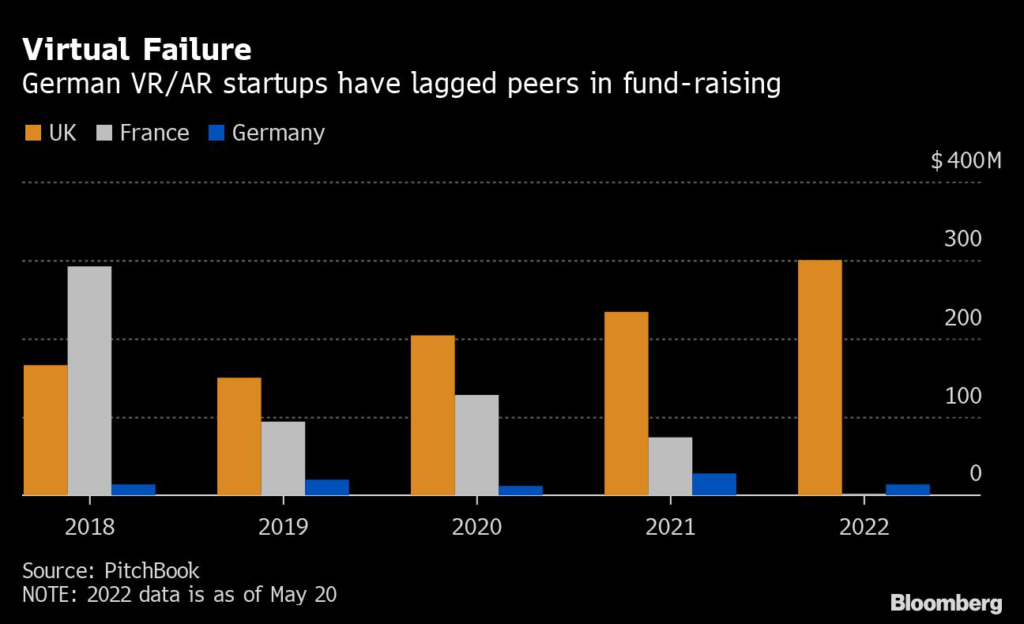(Bloomberg) — Meta Platforms Inc.’s ongoing battle with German regulators has created a stumbling block for the country’s nascent virtual reality industry.
Local startups have been struggling to get their hands on Meta’s headsets after they were pulled from the shelves. Now they are having to choose whether to develop applications using less popular rival headsets, or give up on the fast-growing $4.4 billion market.
“The sales stop of Oculus Meta already has an immense impact on us, since the complete B2C sector cannot be served with it,” said Christian Gnerlich, founder of Brainjo, a Regensburg-based VR company that specializes in brain-training software. “Almost no one has a pair of VR glasses.”
Meta removed its Oculus headsets from the German market in 2020, fewer than three months after the country’s top court confirmed an allegation that Facebook was abusing its dominant position. Later that year, the Federal Cartel Office opened a probe into the requirement that its Quest 2 headset users register a Facebook account in order to operate the device.
A spokesperson for the company declined to comment on why it doesn’t sell the headsets in Germany.
In the meantime, German virtual reality firms have lagged far behind peers in the UK, France, Israel and Switzerland in fund-raising, according to data compiled by PitchBook.
Meta is the world’s top VR headset maker, with 80% market share according to research firm IDC. Customers have spent over $1 billion on Meta’s Quest store content, in part driven by Facebook founder Mark Zuckerberg’s obsession with the so-called metaverse, a virtual world that blends gaming, VR and social media. JPMorgan estimates spending in the metaverse could eventually reach $1 trillion.
While it is possible to get Quest 2 headsets delivered to Germany via Amazon stores hosted by other EU nations, the workaround is an added cost to developers and depresses demand among potential clients.
Regulatory Battles
The dispute between Meta and the Federal Cartel Office is one of several cases where the company’s data policies and practices have triggered concerns in Germany. Regulators have banned the company from collecting data of German users of its WhatsApp messaging service, while this year the nation’s top civil court ruled Facebook can’t deny locals the right to use invented names.
“Facebook isn’t looked on fondly,” said Daniel Pots, the co-founder of VR Bits, a Leipzig-based developer for corporate safety training and marketing solutions. “As many of our clients come from industry – important industrial sectors like electricity providers – they’re very concerned with data protection.”
While Meta is the dominant player in the industry, there are signs that competition is heating up. Some developers have hailed the ByteDance Ltd.’s Pico Neo as comparable quality to the Quest 2, while Apple Inc. executives recently previewed an mixed-reality headset to the company’s board, according to people familiar with the matter.
The market for VR devices may grow by 27% annually through 2026, according to Mandeep Singh, a senior tech analyst at Bloomberg Intelligence.
VR Bits has been working to convert some of their products for alternative headsets, including the Chinese-made Pico Neo, according to Pots.
‘Insane Market Dominance’
“More and more people are saying that Pico headsets are a lot easier to maintain,” said Soenke Kirchhof, the head of VR production studio INVR. “Facebook has an insane market dominance and that needs to be broken. There’s no market when there’s only one developer.”
Other companies also face questions over information security. Last year, Ireland’s Data Protection Commission began two probes of ByteDance’s TikTok video sharing app, including one after Irish privacy chief Helen Dixon expressed concerns it was sending some EU user information to China.
VR fitness app developer Icaros, founded in 2015, shifted away from the Oculus system when Meta halted sales, according to Chief Executive Officer and founder Michael Schmidt.
While the results of the Oculus probe are pending, the head of the Federal Cartel Office said this month that Facebook will be to be covered by Germany’s tougher new digital antitrust rules, suggesting regulators and Meta remain at an impasse.
“If Oculus wouldn’t have been so strong in the market, virtual reality would have advanced as a technology much more,” Schmidt said. “We would love to enter their world but we’d also love to see the restrictions fall.”
More stories like this are available on bloomberg.com
©2022 Bloomberg L.P.











